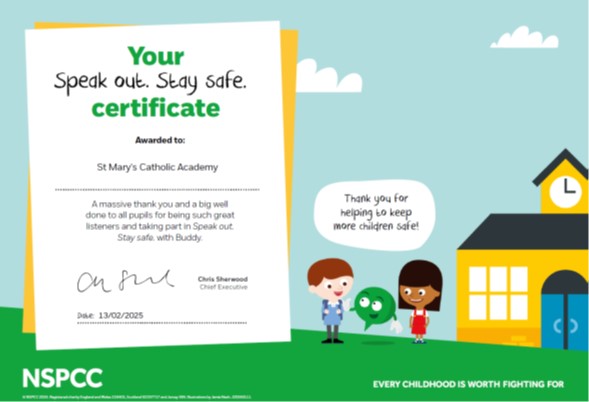Online Safety

We are delighted to inform you that St Mary’s have delivered the NSPCC Speak out Stay safe over the last couple of weeks.
Online Safety Guides for Parents and Cares
https://nationalonlinesafety.com/resources/platform-guides/
Online Safety
Online Safety is always high on the agenda here at St. Mary's Catholic Academy. We have extensive security measures in place, which are constantly monitored both internally and externally, to prevent our pupils from coming into any potential danger or accessing unsuitable material whilst at school.
Lessons are taught from Reception upward explaining and demonstrating how to stay safe online when using the internet and working with technology, which is always referenced to at the beginning of each lesson.
Online Safety encompasses Internet technologies and electronic communications. It highlights the need to educate pupils about the benefits and risks of using technology and safeguards our children by raising awareness to enable them to control their online experience. The school’s online safety policy will operate in conjunction with other poilicies including those for computing, Acceptable Internet Use Agreement, Behaviour, Bullying, Curriculum, Child Protection, Data Protection and Security.
The school’s Online-Safety Lead is our Principal Mrs Rathbone, who is also the Designated Lead for Child Protection.
As a school, we have assigned Digital Leaders from across the Key Stages who help to raise awareness and plan events and quizzes to continually teach and promote Online Safety. We have displays around our school and rules posted in all rooms to display appropriate use and how to stay safe. Our children are also informed that our network and their internet use will be monitored for safety purposes.
Internet Safety
At St. Mary's Catholic Academy we take the issue of Internet Safety very seriously and on these pages you will find information that will support you as parents/guardians.
The internet is a fantastic resource, but it can also bring a lot of risk. We work with our pupils in school to help them understand the dangers and learn how to keep themselves safe.
All pupils are asked to sign an agreement on how they will use the Internet in school. You can view a copy by clicking here.
As a school, we highlighted Online Safety during our Safer Internet Day to make our pupils aware of all the dangers and to encourage them to be safe online.
Click here to go to the Safer Internet Day website for more information
Your help is still needed to prevent children accessing inappropriate material at home by way of filters and parental controls. Look below at our extensive list of links and resources for Parents/Carers, Teachers and Young People to help you with your child’s online safety at home.
CEOP
https://www.ceop.police.uk/safety-centre/
The CEOP (Child Exploitation and Online Protection Centre) is on a lot of social networking sites. It is the Advice, Help and Report button. Clicking on it will take you to their website, where you can easily follow links for help if you are a parent or child. It is excellent, so please try it now!
Thinkyouknow
Highly recommended is the Thinkyouknow website. Click the image to go to the website and get the latest safety information.
This is an education initiative by CEOP - the UKs national law enforcement agency that focuses on tackling sexual abuse of children.
Below are some quick links for parents to some key questions and Top Tips in their 'Growing up online' section.
What is my child doing online?
How do I talk to my child about what they're doing online?
What risks might my child face?
What tools are there to help me keep my child safe?
Childnet International
Childnet International – Guidance for Parents, Teachers and Young People
This contains detailed information regarding specific topics such as social networking, online grooming, gaming and downloading.
A simple and effective way to get involved with your children and their lives online is through discussion. Why not use our conversation starters for parents and carers to get the ball rolling? Click on the picture above.
CBBC Stay Safe
CBBC Stay Safe is a super internet survival guide for you and your child/ren. Here are the tips and tricks you'll need to stay safe online, beat the cyber-bullies and become a super-surfer.
NSPCC Share Aware Campaign
Launched in January 2015, this campaign aims to raise awareness of how to help your child stay safe on social networks, apps and games. They have a useful guide to the social networks young people are using on their Net Aware website: http://www.net-aware.org.uk/
Links for Parents/Carers
Ask About Games - Advice on computer gaming and how to apply parental controls
-
Early Years e-safety - help introduce young children to the idea of internet safety
-
Get Safe Online - Advice and guidance on Safety online
-
Vodaphone Safety - Advice from Vodaphone
-
Yahoo Safety Tips - Advice from Yahoo
-
CBBC Safe search – Excellent Child friendly Search engine for Primary Schools
-
NEN Image Gallery - for images to use in the classroom
-
TeacherTube - Video Sharing website
-
Edublogs - Blogging in Schools
-
Easywhois - Useful website to check who registered/owns a website
-
All about Explorers - Teaching children to evaluate reliability of online information.
-
That's Not Cool - advice on digital relations for KS2/3/4
-
Windows family safety - Set up Windows safety controls.
Software to help you
Anti Bullying App
We do not allow mobile phones in school, which combats phone bullying here, but we know that mobiles are used outside school. You can help your child by using an Android App which blocks the bully's number, so you don't have to receive unwanted texts or calls. The bully doesn't know that their number is blocked. It is now a free app. Click the image to find out more.
This software blocks inappropriate websites, including pornographic ones. It also monitors emails and social networks for unsuitable content, grooming phrases, sex words and other danger words. Click the image to find out more.
SelfieCop app - teach your children to use their camera phone safely - please click the link on the menu on the right to find out more. Click the image to find out more.
Visit Google's Safety Centre to learn how to change Google's search settings to SafeSearch filtering: http://www.google.co.uk/familysafety/tools.html
This setting is designed to screen sites with explicit sexual text and images that you don't want your child to stumble across when browsing the internet.
Top Tips for Safer Surfing!
1. Remind your child that the internet is not a private space. Any information that your child puts online can be shared with anyone and may be used in a harmful way.
2. Keep communication open! Let your child know that it’s never too late to tell if something or someone is making them uncomfortable.
3. Teach your child to only open emails from people they know. Files may contain inappropriate images, content or viruses
4. Keep the computer somewhere in the house where it is easy for you to monitor what they are viewing.
5. Use internet filtering software and your browser’s control to offer the degree of security needed to protect your child.
What are the dangers and risks to my child from the internet?
|
Content |
Contact |
Conduct |
|
|
Commercial |
Adverts Spam |
Personal information given |
Illegal downloading |
|
Aggressive |
Violent content |
Being Bullied |
Bullying others |
|
Sexual |
Pornographic images/text |
Being Groomed |
Uploading inappropriate material |
|
Values |
Racism |
Is subject to persuasion (self-harm/anorexia) |
Providing misleading info to others |
Information on the table was taken from "Safer Children in a Digital World" - a report by Dr Tanya Byron.
You can download for free the report or its summary on the Department for Education website
Did you know that Facebook requires users to be 13 years old before they can create their own account?
Digizen
Digizen is a game provided by Childnet International. You can play Digizen with your child. This game gives you different decisions and options to make about internet use and friendships in a school day and the consequences. Click the image to find out more.
For more information about Safeguarding please visit:
www.safeguardingchildren.stoke.gov.uk
Useful guides for online safety


5 / 6
